高中英语人教版必修五Unit1 Great Scientists Using LanguageⅡ课件(26张)
文档属性
| 名称 | 高中英语人教版必修五Unit1 Great Scientists Using LanguageⅡ课件(26张) |

|
|
| 格式 | zip | ||
| 文件大小 | 264.0KB | ||
| 资源类型 | 教案 | ||
| 版本资源 | 人教版(新课程标准) | ||
| 科目 | 英语 | ||
| 更新时间 | 2018-08-21 00:00:00 | ||
图片预览


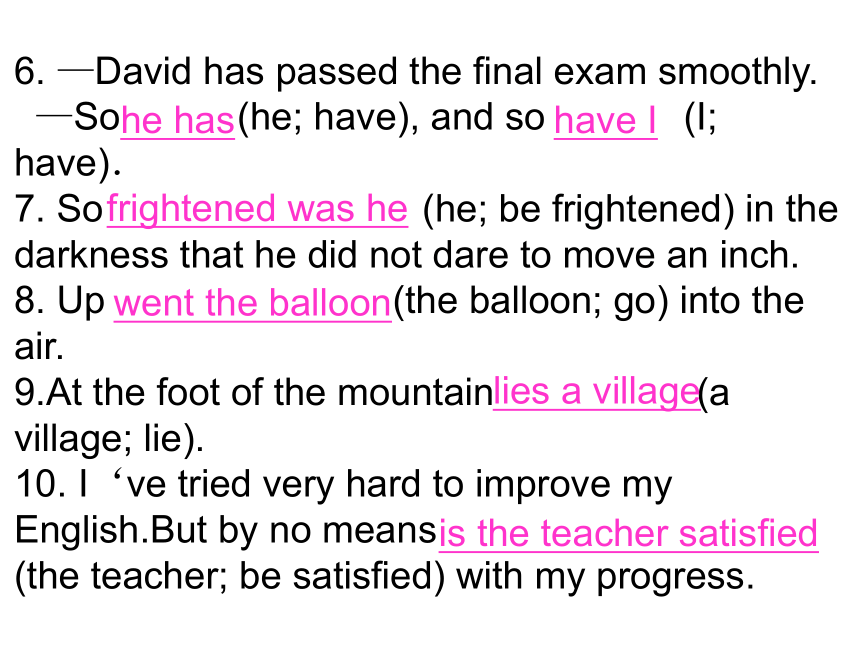
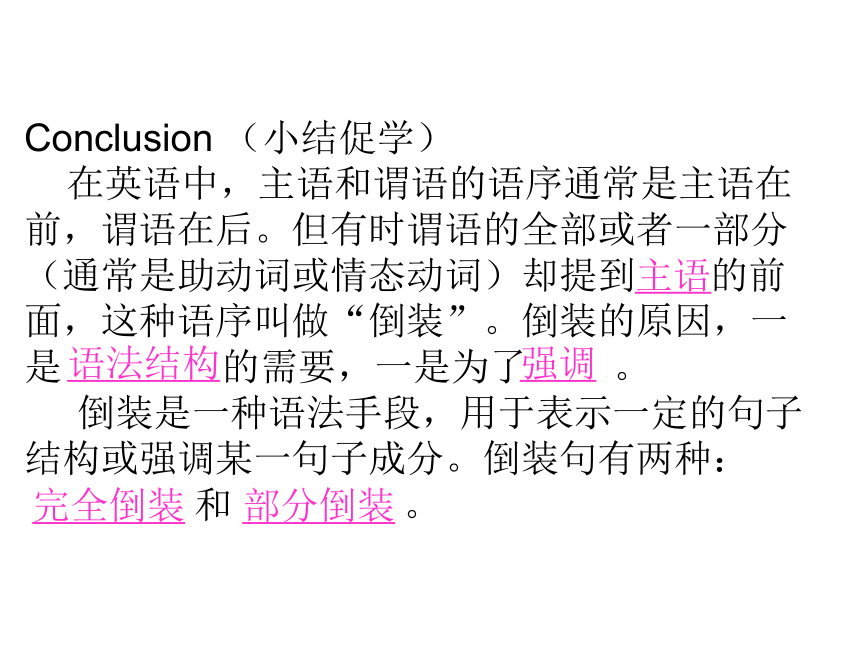
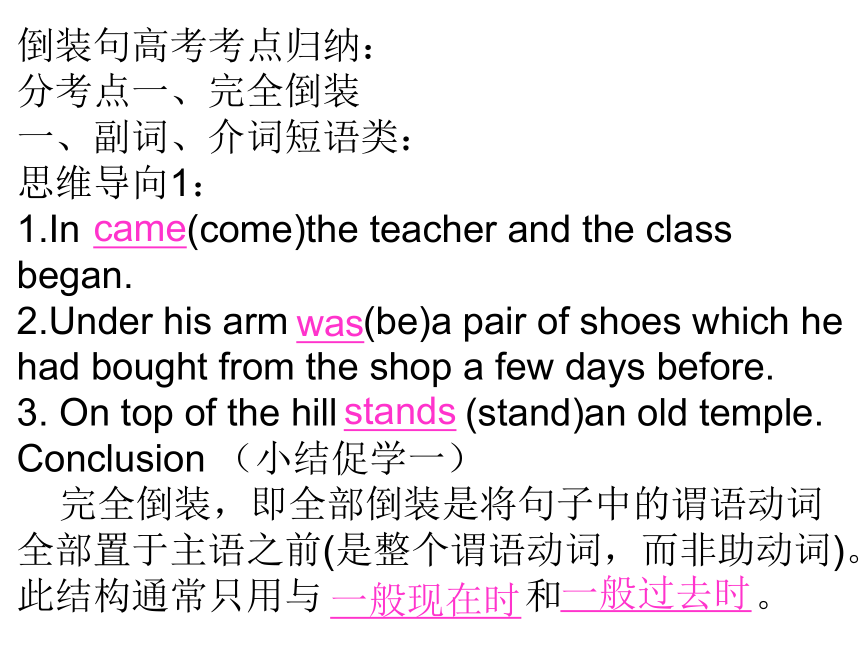
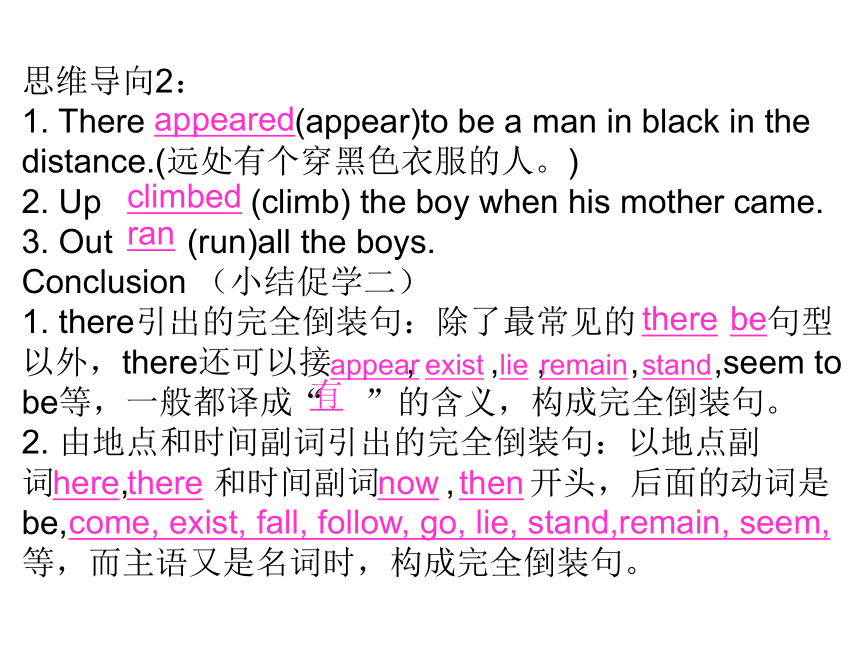
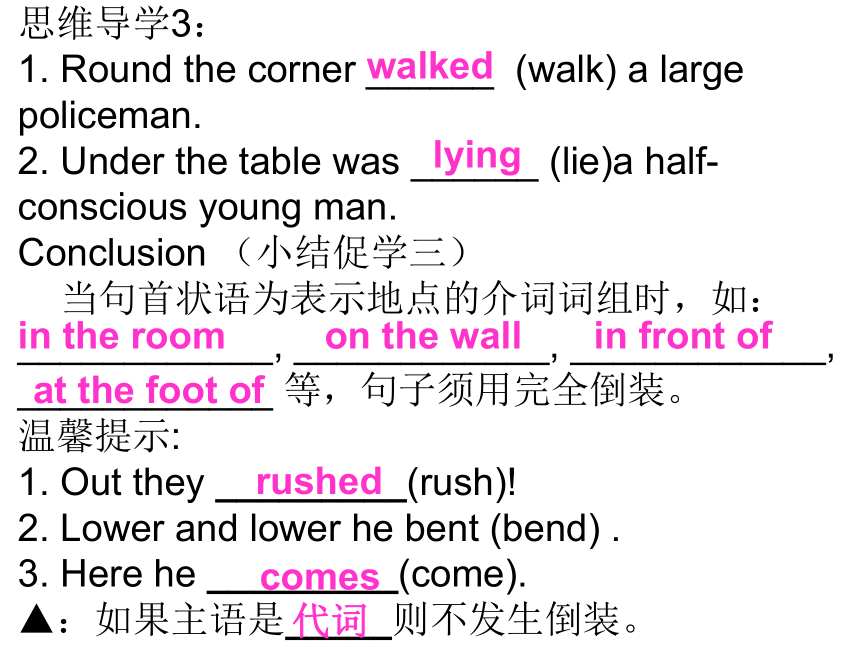
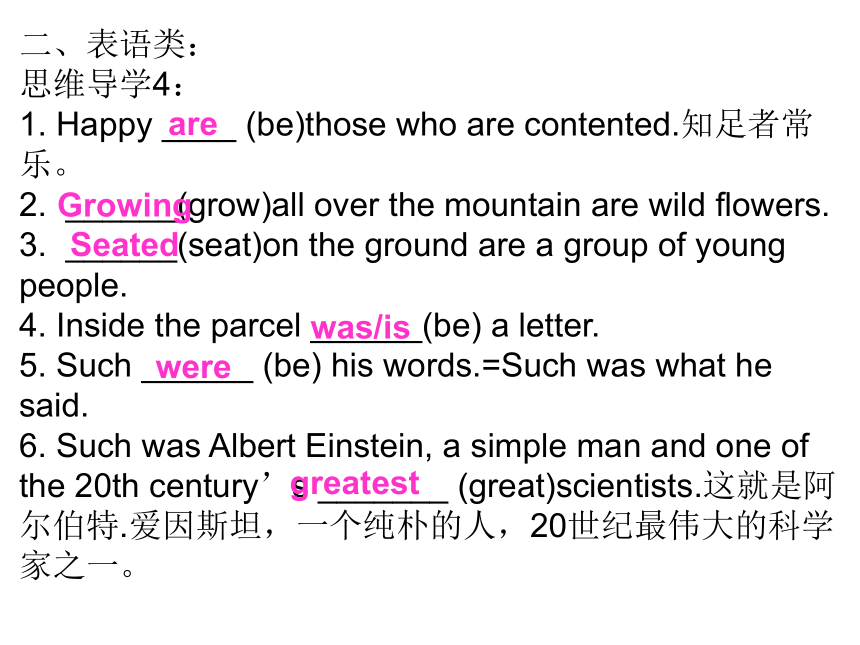
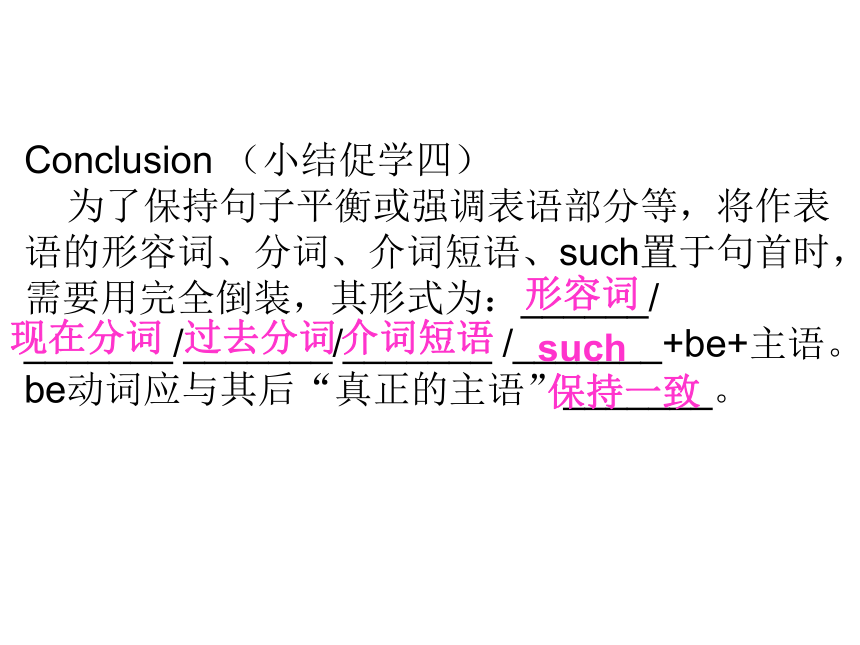
文档简介
课件26张PPT。倒装句
导学案根据括号中的提示完成句子,注意句式结构。 1. Not until (I; shout) at the top of my voice (he; turn) his head. 2. I won the prize at last.Never in my life (I; feel) so happy. 3. Hardly (the thief; see) the policeman he ran away. 4. —Hurry up! There (the bell; go). —My goodness! Has Mrs.Li come yet? —Look! Here (she; come). 5. Not only (he; like)singing, but (he; have) a good voice. I shouteddid he turnhave I felthad the thief seengoes the bellshe comeswhendoes he likehe has6. —David has passed the final exam smoothly. —So (he; have), and so (I; have). 7. So (he; be frightened) in the darkness that he did not dare to move an inch. 8. Up (the balloon; go) into the air. 9.At the foot of the mountain (a village; lie). 10. I‘ve tried very hard to improve my English.But by no means (the teacher; be satisfied) with my progress.he hashave Ifrightened was hewent the balloonlies a villageis the teacher satisfiedConclusion (小结促学) 在英语中,主语和谓语的语序通常是主语在前,谓语在后。但有时谓语的全部或者一部分(通常是助动词或情态动词)却提到 的前面,这种语序叫做“倒装”。倒装的原因,一是 的需要,一是为了 。 倒装是一种语法手段,用于表示一定的句子结构或强调某一句子成分。倒装句有两种: 和 。主语语法结构强调完全倒装部分倒装倒装句高考考点归纳: 分考点一、完全倒装 一、副词、介词短语类: 思维导向1: 1.In (come)the teacher and the class began. 2.Under his arm (be)a pair of shoes which he had bought from the shop a few days before. 3. On top of the hill (stand)an old temple. Conclusion (小结促学一) 完全倒装,即全部倒装是将句子中的谓语动词全部置于主语之前(是整个谓语动词,而非助动词)。此结构通常只用与 和 。camewasstands一般现在时一般过去时思维导向2: 1. There (appear)to be a man in black in the distance.(远处有个穿黑色衣服的人。) 2. Up (climb) the boy when his mother came. 3. Out (run)all the boys. Conclusion (小结促学二) 1. there引出的完全倒装句:除了最常见的 句型以外,there还可以接 , , , , ,seem to be等,一般都译成“ ”的含义,构成完全倒装句。 2. 由地点和时间副词引出的完全倒装句:以地点副词 , 和时间副词 , 开头,后面的动词是be, 等,而主语又是名词时,构成完全倒装句。appearedclimbedrantherebeappearexistlieremainstand有heretherenowthencome, exist, fall, follow, go, lie, stand,remain, seem,思维导学3: 1. Round the corner ______ (walk) a large policeman. 2. Under the table was ______ (lie)a half-conscious young man. Conclusion (小结促学三) 当句首状语为表示地点的介词词组时,如:____________, ____________, ____________, ____________ 等,句子须用完全倒装。 温馨提示: 1. Out they _________(rush)! 2. Lower and lower he bent (bend) . 3. Here he _________(come). ▲:如果主语是_____则不发生倒装。walkedlyingin the roomon the wallin front ofat the foot of rushed comes代词二、表语类: 思维导学4: 1. Happy ____ (be)those who are contented.知足者常乐。 2. ______(grow)all over the mountain are wild flowers. 3. ______(seat)on the ground are a group of young people. 4. Inside the parcel ______(be) a letter. 5. Such ______ (be) his words.=Such was what he said. 6. Such was Albert Einstein, a simple man and one of the 20th century’s _______ (great)scientists.这就是阿尔伯特.爱因斯坦,一个纯朴的人,20世纪最伟大的科学家之一。 areGrowingwas/isSeatedweregreatestConclusion (小结促学四) 为了保持句子平衡或强调表语部分等,将作表语的形容词、分词、介词短语、such置于句首时,需要用完全倒装,其形式为:______/ _______/_______/_______ /_______+be+主语。be动词应与其后“真正的主语”_______。 形容词现在分词过去分词介词短语such保持一致分考点二、部分倒装 思维导学1: Nor ____ (do)he let the disease stop him from _____ (live) the kind of life he has always dreamt about. (疾病没有使他放弃过上梦想中的生活) Conclusion (小结促学一) 部分倒装即只把谓语的一部分(如_____、______、_______等)放到主语前,或把句子的强调成分提前。didlivingbe动词 助动词情态动词思维导学2: 1. Only yesterday did he find out that his watch ____ ______ (miss). 2. 唯有用这种方法才能学好英语。 ___________________________________ 3. Only after he had spoken out the word ___ he ______ (realize)he had made a big mistake. Conclusion (小结促学二) 当句首状语由“only +_____”,“only +______”,“only +_______”构成时,句子须倒装。另only修饰状语从句时,_____倒装,______不倒装。wasmissingOnly in this way can we learn English well.didrealize副词介词词组状语从句主句从句温馨提示: 如果only修饰____时,句子不倒装. 1. 只有王玲知道这件事。 ________________________ 2. 只有他能回答这个问题。 _______________________________ 思维导学3: 1. So small ____ (be) the mark that I could hardly see it. 2. So quickly ____ (do) the workmen finish their work that they were given a bonus. 3. So much ____ (do) he worry about his financial position that he can’t sleep at night. 4. Such good use ____ (do) he make of his spare time that his English has improved a lot.主语Only Wang Ling knows this . Only he can answer the question. wasdiddoesdoesConclusion (小结促学三) 在“so+______...that...”句型与“such+__+that...”句型中,such/so连同它们所修饰的成分置于句首时,主句用________,that从句______。在该结构中,“so +形容词”是表语的前置;“so +副词”是状语的前置。 温馨提示: 1. “What do you mean?” asked Henry. 2. “What do you mean?” he asked. 在直接引语后常跟asked Mary, answered John, said the old lady, grunted(嘟哝) Peter之类的词语。在这些词语中,动词常用在主语之前,当主语是____时,不用倒装。如句__。adj./advn.不倒装代词2部分倒装思维导学4: 1. You are young and so____ (be) I. 2. She likes music and so ____ (do) I. 3. If he can do it, so can I. 4. He had no friends, ___________ did he wish to make any. Conclusion (小结促学四) “so/neither/nor+be动词/助动词/情态动词+主语”表示前一句中的内容也适合于另一人或物, 意为________________ 温馨提示: -It is hot today. -So it is. “so+同一主语+be动词/助动词/情态动词”表示对前面所述情况的肯定。amdonor /neither“...也(不)是如此”。思维导学5: 1. Small ___ the atom is, we can smash(粉碎) it. 2. Hard as he ______ (work), he did not pass the exam. 3. ______ (tire) as he was, he continued the work. 4. ______ (children) as he is, he is always ready to help others. Conclusion (小结促学五) 在as, though引导的让步状语从句中,一般将形容词、副词或名词等置于句首。在as引导的让步状语从句中,位于句首的可以是形容词、名词、副词,还可以是谓语动词的一部分,从而形成从句的部分倒装。其结构为:__________________+as/though+主语+其他. 如果表语是_____________,需把____省去。如例___。asworkedTiredChild表语/状语/动词原形可数名词单数冠词4温馨提示: though作“虽然”讲时,其引导的让步状语从句也可不倒装;although,while作“虽然”讲时,其引导的让步状语从句___用倒装。 Search as/though they would, they could find nobody in the house. = ________they would search, they could find nobody in the house. 思维导学六; scarcely……when, no sooner ……than, hardly……when, not only...but also..., not until, neither...nor...等句式中的部分倒装。不能Although导1: 1. Hardly had he ______ (arrive) when he was asked to leave again. 2. No sooner had I got home than it ______ (begin) to rain. 3. Scarcely had we _______ (finish) our dinner when the electricity was cut off. 小结1: 在scarcely……when, no sooner ……than, hardly……when引导的主从复合句主句要求使用___________,从句用___________。如果no sooner或hardly/scarcely 放在句首,需用部分倒装,_____倒装,_____不倒装。arrivedbeganfinished过去完成时一般过去时主句从句导2: 1. Not only should we not be afraid of _________ (difficulty), but also we should try our best to overcome them. 2. Not only will help ____ _____ (give) to people to find jobs, but also medical treatment will be provided for people who need it. 小结2: not only...but also... 连接两个分句时,如果not only置于句首,需将____ ____所在的句子部分倒装,____ ____ 引导的句子不倒装。但not only...but also... 仅连接两个________,则不用倒装。如:Not only you but also I am fond of music.difficultiesbegivennotonlybut(also)并列词语导3: 1. Not until yesterday ___ (do) little John change his mind. 2. Not until all the demands had been turned down did the workers ______ __ ___ ___ _____. 一直到所有的要求遭到拒绝之后,工人们才决定罢工。 3. Not once did he talk to me. 译:______________________。 小结3: not until(直到……才),not a(一个……也没有),not in the least(一点儿也不),not for a minute/moment(一点儿也不)等位于句首时,通常用部分倒装,(not a之后的名词作主语时除外),其中not until... 置于句首时,____倒装,_____不倒装。diddecidetogoonstrike他一次也没有和我谈过主句从句导4: 1. Neither is he a good child nor is he a good student. 2. Neither can I ride a bike nor can I swim. 小结4: 当neither...nor... 连接两个分句,且位于句首时,前后两个句子都要倒装。 思维导学7: 1. We laugh ___ jokes, but seldom do we think about how they work. 2. In no case must force ___ ________ (resort) to. 决不准许诉诸武力。 3. By no means ___ (be) it true ____ all English people know their own language well. 4. ________ no circumstances should you lend Paul any money. atberesortedisthatUnder/InConclusion (小结促学七): 具有否定意义的副词______, ______, _______, ____, _______, ______, ______, _____, ______, ____, _______等或含否定词的介词短语at no time; by no means; by no manner of means(绝不); for no reason; in no case; in/under no circumstances(无论如何都不); in no sense; in no way; on no account; on no consideration(绝不); at no point等置于句首时,句子常用________。barelyhardlyscarcelylittleseldomneverrarelynorneithernotnowhere部分倒装思维导学8: 1. _____ you need more information,please let me know.=If you should need more information, please let me know. 2. ____ (have)you worked harder at college, you would have got better job. 3. ____ (be)he better qualified, he would apply for the position. Conclusion(小结促学八) If引导的非真实条件状语从句中,省去if时,_____, _____, ______须移至主语之前,构成部分倒装。ShouldHadWerewerehadshould思维导学9: ___ ______ books you read(宾语提前),___ _____ your knowledge is(表语提前). 书读得越多,知识就越渊博。 Conclusion(小结促学九) the more...,the more...结构中的倒装,在以the more..., the more...引导的倒装结构中,采用部分倒装。 思维导学10: 在某些表示祝愿的句型中要求倒装。 1. May you live a long and happy life! 2. May you happy. 3. Long live the People’s Republic of China! Themorethewider达标检测: 一、根据句意完成下列句子。 1. Mary never does any reading in the evening, ________________ . (约翰也不在晚上阅读) 2. Should _____________ (如果明天下雨), we would have to put off the sports meet. 3. _____________________ (尽管他可能是一名安静的学生), he talks a lot about his favorite singers after class. 4. Not until the early years of the 19th century ___________ (人类才知道)what heat is. 5. __________________________ (我们一听到铃声) than we rushed into the classroom. 6. So__________________________ (他看小说如此着迷) that he did not notice his father at the door. nor/neither does Johnit rain tomorrowQuiet student as he may bedid man knowNo sooner had we heard the ringabsorbed was he in the novel7. They arrived at the farmhouse, in front of which _________________ .(坐着一位小男孩) 8. By no means __________________________(不应该看不起) the poor. 二、翻译下列句子,注意特殊句式的运用。 1. 我最近极少碰见他。 _________________________________ 2. 我一坐下来他就踏进了屋子。 ____________________________________________ 3. 父亲冲了出去,手里拿着刚收到的信。 ____________________________________________4. 尽管你很强壮,你还是不能举起这个重重的箱子。 sat a small boyshould we look down upon Seldom have I met him recently. Hardly/Scarcely had I sat down when he stepped into the room.
/No sooner had I sat down than he stepped into the room.
Out rushed Father, with the letter he just received in his hand. ____________________________________________5. 他不仅听见了,而且还看见了。 ____________________________________________6. 没有一件事像打篮球那样有趣。(There be句型) ____________________________________________7. 只有努力你才能在学习上有好的表现. ____________________________________________ 8. 直到离开家他才开始明白家对于他是多么重要。 ____________________________________________ 9. 如果你努力学习,你现在就是一名大学生了。 (虚拟;倒装;省略) ____________________________________________Strong as/though you are, you can't lift the heavy box up. Not only did he hear it, but he saw it as well. There is nothing so interesting as playing basketball. Only with hard work can you perform well in your study.Not until he left his home did he begin to know
how important the family was for him.Had you studied hard, you might be a college student now.
导学案根据括号中的提示完成句子,注意句式结构。 1. Not until (I; shout) at the top of my voice (he; turn) his head. 2. I won the prize at last.Never in my life (I; feel) so happy. 3. Hardly (the thief; see) the policeman he ran away. 4. —Hurry up! There (the bell; go). —My goodness! Has Mrs.Li come yet? —Look! Here (she; come). 5. Not only (he; like)singing, but (he; have) a good voice. I shouteddid he turnhave I felthad the thief seengoes the bellshe comeswhendoes he likehe has6. —David has passed the final exam smoothly. —So (he; have), and so (I; have). 7. So (he; be frightened) in the darkness that he did not dare to move an inch. 8. Up (the balloon; go) into the air. 9.At the foot of the mountain (a village; lie). 10. I‘ve tried very hard to improve my English.But by no means (the teacher; be satisfied) with my progress.he hashave Ifrightened was hewent the balloonlies a villageis the teacher satisfiedConclusion (小结促学) 在英语中,主语和谓语的语序通常是主语在前,谓语在后。但有时谓语的全部或者一部分(通常是助动词或情态动词)却提到 的前面,这种语序叫做“倒装”。倒装的原因,一是 的需要,一是为了 。 倒装是一种语法手段,用于表示一定的句子结构或强调某一句子成分。倒装句有两种: 和 。主语语法结构强调完全倒装部分倒装倒装句高考考点归纳: 分考点一、完全倒装 一、副词、介词短语类: 思维导向1: 1.In (come)the teacher and the class began. 2.Under his arm (be)a pair of shoes which he had bought from the shop a few days before. 3. On top of the hill (stand)an old temple. Conclusion (小结促学一) 完全倒装,即全部倒装是将句子中的谓语动词全部置于主语之前(是整个谓语动词,而非助动词)。此结构通常只用与 和 。camewasstands一般现在时一般过去时思维导向2: 1. There (appear)to be a man in black in the distance.(远处有个穿黑色衣服的人。) 2. Up (climb) the boy when his mother came. 3. Out (run)all the boys. Conclusion (小结促学二) 1. there引出的完全倒装句:除了最常见的 句型以外,there还可以接 , , , , ,seem to be等,一般都译成“ ”的含义,构成完全倒装句。 2. 由地点和时间副词引出的完全倒装句:以地点副词 , 和时间副词 , 开头,后面的动词是be, 等,而主语又是名词时,构成完全倒装句。appearedclimbedrantherebeappearexistlieremainstand有heretherenowthencome, exist, fall, follow, go, lie, stand,remain, seem,思维导学3: 1. Round the corner ______ (walk) a large policeman. 2. Under the table was ______ (lie)a half-conscious young man. Conclusion (小结促学三) 当句首状语为表示地点的介词词组时,如:____________, ____________, ____________, ____________ 等,句子须用完全倒装。 温馨提示: 1. Out they _________(rush)! 2. Lower and lower he bent (bend) . 3. Here he _________(come). ▲:如果主语是_____则不发生倒装。walkedlyingin the roomon the wallin front ofat the foot of rushed comes代词二、表语类: 思维导学4: 1. Happy ____ (be)those who are contented.知足者常乐。 2. ______(grow)all over the mountain are wild flowers. 3. ______(seat)on the ground are a group of young people. 4. Inside the parcel ______(be) a letter. 5. Such ______ (be) his words.=Such was what he said. 6. Such was Albert Einstein, a simple man and one of the 20th century’s _______ (great)scientists.这就是阿尔伯特.爱因斯坦,一个纯朴的人,20世纪最伟大的科学家之一。 areGrowingwas/isSeatedweregreatestConclusion (小结促学四) 为了保持句子平衡或强调表语部分等,将作表语的形容词、分词、介词短语、such置于句首时,需要用完全倒装,其形式为:______/ _______/_______/_______ /_______+be+主语。be动词应与其后“真正的主语”_______。 形容词现在分词过去分词介词短语such保持一致分考点二、部分倒装 思维导学1: Nor ____ (do)he let the disease stop him from _____ (live) the kind of life he has always dreamt about. (疾病没有使他放弃过上梦想中的生活) Conclusion (小结促学一) 部分倒装即只把谓语的一部分(如_____、______、_______等)放到主语前,或把句子的强调成分提前。didlivingbe动词 助动词情态动词思维导学2: 1. Only yesterday did he find out that his watch ____ ______ (miss). 2. 唯有用这种方法才能学好英语。 ___________________________________ 3. Only after he had spoken out the word ___ he ______ (realize)he had made a big mistake. Conclusion (小结促学二) 当句首状语由“only +_____”,“only +______”,“only +_______”构成时,句子须倒装。另only修饰状语从句时,_____倒装,______不倒装。wasmissingOnly in this way can we learn English well.didrealize副词介词词组状语从句主句从句温馨提示: 如果only修饰____时,句子不倒装. 1. 只有王玲知道这件事。 ________________________ 2. 只有他能回答这个问题。 _______________________________ 思维导学3: 1. So small ____ (be) the mark that I could hardly see it. 2. So quickly ____ (do) the workmen finish their work that they were given a bonus. 3. So much ____ (do) he worry about his financial position that he can’t sleep at night. 4. Such good use ____ (do) he make of his spare time that his English has improved a lot.主语Only Wang Ling knows this . Only he can answer the question. wasdiddoesdoesConclusion (小结促学三) 在“so+______...that...”句型与“such+__+that...”句型中,such/so连同它们所修饰的成分置于句首时,主句用________,that从句______。在该结构中,“so +形容词”是表语的前置;“so +副词”是状语的前置。 温馨提示: 1. “What do you mean?” asked Henry. 2. “What do you mean?” he asked. 在直接引语后常跟asked Mary, answered John, said the old lady, grunted(嘟哝) Peter之类的词语。在这些词语中,动词常用在主语之前,当主语是____时,不用倒装。如句__。adj./advn.不倒装代词2部分倒装思维导学4: 1. You are young and so____ (be) I. 2. She likes music and so ____ (do) I. 3. If he can do it, so can I. 4. He had no friends, ___________ did he wish to make any. Conclusion (小结促学四) “so/neither/nor+be动词/助动词/情态动词+主语”表示前一句中的内容也适合于另一人或物, 意为________________ 温馨提示: -It is hot today. -So it is. “so+同一主语+be动词/助动词/情态动词”表示对前面所述情况的肯定。amdonor /neither“...也(不)是如此”。思维导学5: 1. Small ___ the atom is, we can smash(粉碎) it. 2. Hard as he ______ (work), he did not pass the exam. 3. ______ (tire) as he was, he continued the work. 4. ______ (children) as he is, he is always ready to help others. Conclusion (小结促学五) 在as, though引导的让步状语从句中,一般将形容词、副词或名词等置于句首。在as引导的让步状语从句中,位于句首的可以是形容词、名词、副词,还可以是谓语动词的一部分,从而形成从句的部分倒装。其结构为:__________________+as/though+主语+其他. 如果表语是_____________,需把____省去。如例___。asworkedTiredChild表语/状语/动词原形可数名词单数冠词4温馨提示: though作“虽然”讲时,其引导的让步状语从句也可不倒装;although,while作“虽然”讲时,其引导的让步状语从句___用倒装。 Search as/though they would, they could find nobody in the house. = ________they would search, they could find nobody in the house. 思维导学六; scarcely……when, no sooner ……than, hardly……when, not only...but also..., not until, neither...nor...等句式中的部分倒装。不能Although导1: 1. Hardly had he ______ (arrive) when he was asked to leave again. 2. No sooner had I got home than it ______ (begin) to rain. 3. Scarcely had we _______ (finish) our dinner when the electricity was cut off. 小结1: 在scarcely……when, no sooner ……than, hardly……when引导的主从复合句主句要求使用___________,从句用___________。如果no sooner或hardly/scarcely 放在句首,需用部分倒装,_____倒装,_____不倒装。arrivedbeganfinished过去完成时一般过去时主句从句导2: 1. Not only should we not be afraid of _________ (difficulty), but also we should try our best to overcome them. 2. Not only will help ____ _____ (give) to people to find jobs, but also medical treatment will be provided for people who need it. 小结2: not only...but also... 连接两个分句时,如果not only置于句首,需将____ ____所在的句子部分倒装,____ ____ 引导的句子不倒装。但not only...but also... 仅连接两个________,则不用倒装。如:Not only you but also I am fond of music.difficultiesbegivennotonlybut(also)并列词语导3: 1. Not until yesterday ___ (do) little John change his mind. 2. Not until all the demands had been turned down did the workers ______ __ ___ ___ _____. 一直到所有的要求遭到拒绝之后,工人们才决定罢工。 3. Not once did he talk to me. 译:______________________。 小结3: not until(直到……才),not a(一个……也没有),not in the least(一点儿也不),not for a minute/moment(一点儿也不)等位于句首时,通常用部分倒装,(not a之后的名词作主语时除外),其中not until... 置于句首时,____倒装,_____不倒装。diddecidetogoonstrike他一次也没有和我谈过主句从句导4: 1. Neither is he a good child nor is he a good student. 2. Neither can I ride a bike nor can I swim. 小结4: 当neither...nor... 连接两个分句,且位于句首时,前后两个句子都要倒装。 思维导学7: 1. We laugh ___ jokes, but seldom do we think about how they work. 2. In no case must force ___ ________ (resort) to. 决不准许诉诸武力。 3. By no means ___ (be) it true ____ all English people know their own language well. 4. ________ no circumstances should you lend Paul any money. atberesortedisthatUnder/InConclusion (小结促学七): 具有否定意义的副词______, ______, _______, ____, _______, ______, ______, _____, ______, ____, _______等或含否定词的介词短语at no time; by no means; by no manner of means(绝不); for no reason; in no case; in/under no circumstances(无论如何都不); in no sense; in no way; on no account; on no consideration(绝不); at no point等置于句首时,句子常用________。barelyhardlyscarcelylittleseldomneverrarelynorneithernotnowhere部分倒装思维导学8: 1. _____ you need more information,please let me know.=If you should need more information, please let me know. 2. ____ (have)you worked harder at college, you would have got better job. 3. ____ (be)he better qualified, he would apply for the position. Conclusion(小结促学八) If引导的非真实条件状语从句中,省去if时,_____, _____, ______须移至主语之前,构成部分倒装。ShouldHadWerewerehadshould思维导学9: ___ ______ books you read(宾语提前),___ _____ your knowledge is(表语提前). 书读得越多,知识就越渊博。 Conclusion(小结促学九) the more...,the more...结构中的倒装,在以the more..., the more...引导的倒装结构中,采用部分倒装。 思维导学10: 在某些表示祝愿的句型中要求倒装。 1. May you live a long and happy life! 2. May you happy. 3. Long live the People’s Republic of China! Themorethewider达标检测: 一、根据句意完成下列句子。 1. Mary never does any reading in the evening, ________________ . (约翰也不在晚上阅读) 2. Should _____________ (如果明天下雨), we would have to put off the sports meet. 3. _____________________ (尽管他可能是一名安静的学生), he talks a lot about his favorite singers after class. 4. Not until the early years of the 19th century ___________ (人类才知道)what heat is. 5. __________________________ (我们一听到铃声) than we rushed into the classroom. 6. So__________________________ (他看小说如此着迷) that he did not notice his father at the door. nor/neither does Johnit rain tomorrowQuiet student as he may bedid man knowNo sooner had we heard the ringabsorbed was he in the novel7. They arrived at the farmhouse, in front of which _________________ .(坐着一位小男孩) 8. By no means __________________________(不应该看不起) the poor. 二、翻译下列句子,注意特殊句式的运用。 1. 我最近极少碰见他。 _________________________________ 2. 我一坐下来他就踏进了屋子。 ____________________________________________ 3. 父亲冲了出去,手里拿着刚收到的信。 ____________________________________________4. 尽管你很强壮,你还是不能举起这个重重的箱子。 sat a small boyshould we look down upon Seldom have I met him recently. Hardly/Scarcely had I sat down when he stepped into the room.
/No sooner had I sat down than he stepped into the room.
Out rushed Father, with the letter he just received in his hand. ____________________________________________5. 他不仅听见了,而且还看见了。 ____________________________________________6. 没有一件事像打篮球那样有趣。(There be句型) ____________________________________________7. 只有努力你才能在学习上有好的表现. ____________________________________________ 8. 直到离开家他才开始明白家对于他是多么重要。 ____________________________________________ 9. 如果你努力学习,你现在就是一名大学生了。 (虚拟;倒装;省略) ____________________________________________Strong as/though you are, you can't lift the heavy box up. Not only did he hear it, but he saw it as well. There is nothing so interesting as playing basketball. Only with hard work can you perform well in your study.Not until he left his home did he begin to know
how important the family was for him.Had you studied hard, you might be a college student now.
